I wanted to challenge myself to build a completely free SEO tool stack.
SEO tools can get ridiculously expensive when you start stacking them up. If you’re starting out, learning SEO, or you’re an individual freelancer or small business, it’s too expensive to get all these premium tools.
The costs can add up to hundreds, if not thousands, of dollars a month.
But I knew there were some great free options out there. I use a lot of them myself. They save me money and get me amazing results.
I realized you can create an amazing SEO tool stack for free. One that’s capable of generating thousands of Google clicks every month.
Here’s what this free SEO tool stack can do:
- Complete keyword research
- Full website audits and technical analysis
- Competitor research
- Content briefs that are almost guaranteed to rank
- Final optimization touches for your pages
Let me show you each tool you need to build a complete SEO strategy. For free.
Don’t want to read? I got you:
Keyword Research (3 Free Tools That Deliver)
Most people start with keyword research. You want to see if there’s volume, how hard it’ll be to rank, and what topics are available to target.
1. Shuttle SEO: The Hidden Gem
This is a new tool I’ve come across – Shuttle SEO. It’s actually one of the few that’s completely free.

It gives you hundreds of keyword ideas. Based on what people are really searching on Google. The questions they’re asking.
Here’s how it works:
Type in “surfing in Australia” and hit find keywords. It goes off and does research for you.
Boom. In a minute or two, it comes back with 55 questions. These are essentially dozens of long-tail keywords.
If you were a travel company in Australia targeting surfing, you could answer all these questions in sequential order.

The cool thing about this tool? Unlike most free tools, it actually gives you the volume.
You can see some of these are quite low volume. So you might need a little more research or use your instinct to see if it’s worth going after these search terms.
But you can also see the competition and CPC. Another handy metric.
“surding in western australia” shows 110 volume, low competition, and low CPC. That’s a good top-of-funnel piece of content right there.

You can go through and start filtering this out. There are loads of questions here you could target.
2. AlsoAsked: The Question Goldmine
I’d also go to AlsoAsked.com. It’s similar but gives you a different set of results.
They give you three free searches a day. After that, you pay. But honestly, the amount of information you get from three searches will give you enough content ideas for weeks and months.
What’s cool about Also Ask? It builds you a topic map already.
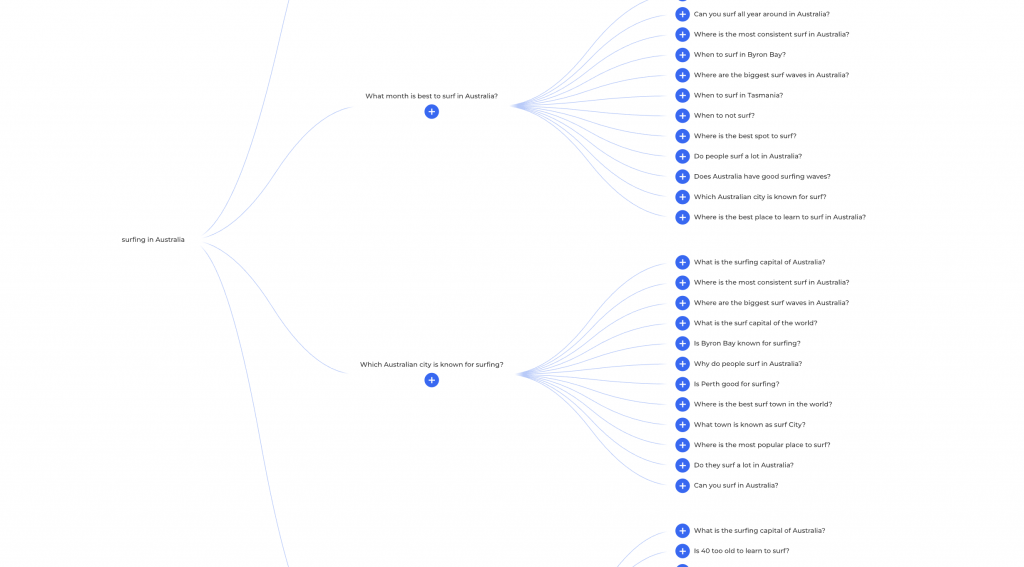
You can see how to build a content strategy and develop topical authority.
You get the main overarching question: “Does Australia have good surfing?” Then you get a list of other questions you can build into briefs or write as separate articles.
- What is Australia’s best beach?
- Can you surf in Australia all year round?
You’ve got so many questions to answer for your content. Between those two tools, you’re going to get great results.
3. Semrush: The Data Powerhouse
To top it off, I’d also use Semrush. It’s a premium tool that gives you 10 free searches a day.
Put your keyword into Semrush on the free tier. You can get a free account and it starts giving you loads of data.
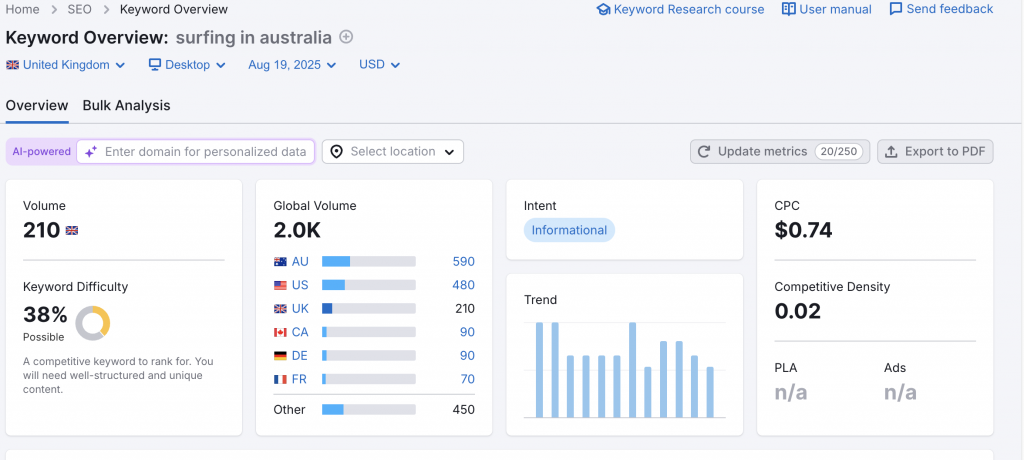
You can see:
- The volume behind it (global and local)
- Keyword difficulty
- Trends through the year
- Other questions and keywords with data
You can dig into your 10 free searches a day. Start picking out more keywords and filtering by difficulty and volume.
If you use these tools once a day for a week, you’ll have all the keyword research you need to start building serious traffic to your website.
Website Audits (Find What’s Broken)
Next in an SEO strategy, you want to look at website audits. Whether that’s content audits to find gaps or complete technical audits.
There are free tools that can do this entire job for you. Particularly for small and medium-sized websites.
4. Google Search Console: Your Foundation
You have to start with Google Search Console. This gets you 70% of the way there.
It won’t help you spot all errors, but you can do a quick checkup to see how a website is performing.
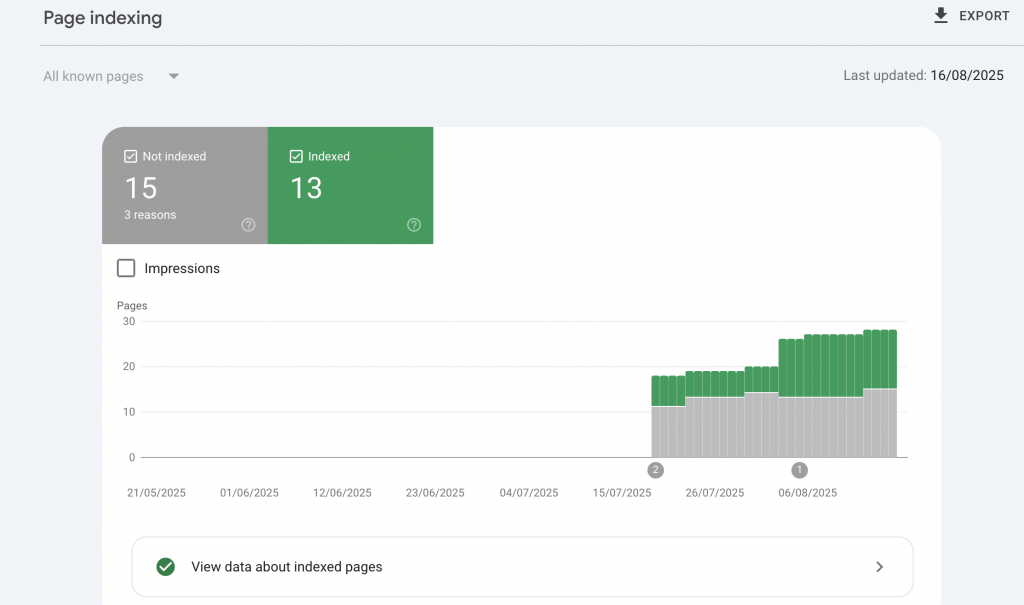
You can see:
- Any errors preventing pages from being indexed
- Site maps
- Link structures
- Security issues
The settings tab at the bottom is quite cool. It gives you crawl stats. You can see how much a website’s being crawled and if there are any interruptions.
A lot of what I do revolves around Google Search Console anyway. Whether I’m using paid tools or not.
This is completely free and gives you so much information. Both from a technical point of view and for looking at keywords. You can start to see areas where sites have suffered problems and why things have dropped off.
5. Screaming Frog: The Technical Beast
This next tool is called Screaming Frog. Virtually every technical or high-quality SEO has heard of this tool and used it extensively.
The cool thing? It has a really generous free tier.
You can download it, pop your website into the top, and get this tool to do a technical crawl of your website. You can even hook it into Google Search Console to get a full look at your website.
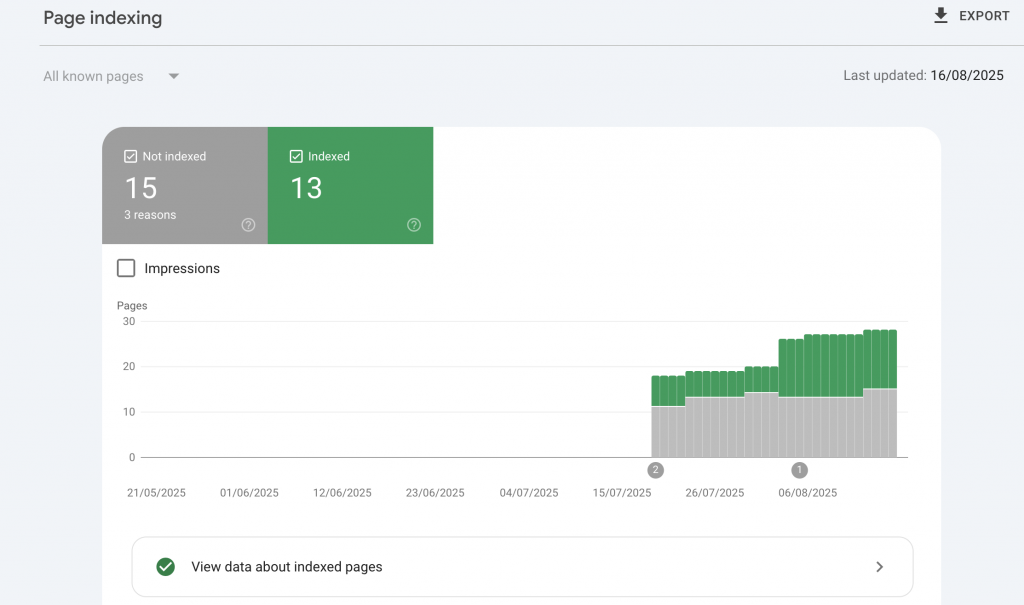
It starts crawling everything on your website. Then it categorizes any issues you might have.
You can see things like:
- Pages with no follow directives
- Low content pages that need addressing
- Images missing alt text
- All those basic technical issues
It looks at how pages are sequentially ordered and all sorts of really technical stuff.
Even if you’re a beginner, it gives you the priority and issue type with explanations. You can go fix issues or figure out what the problem means. Ask ChatGPT or Google to find out how to fix it.
6. Page Speed Insights: Google’s Speed Test
Finally, we’re going to use Page Speed Insights. This is a tool from Google. So as usual, completely free.
It analyzes the page speed of your website and looks for any issues. How a website loads, if it’s slow, and other SEO factors.
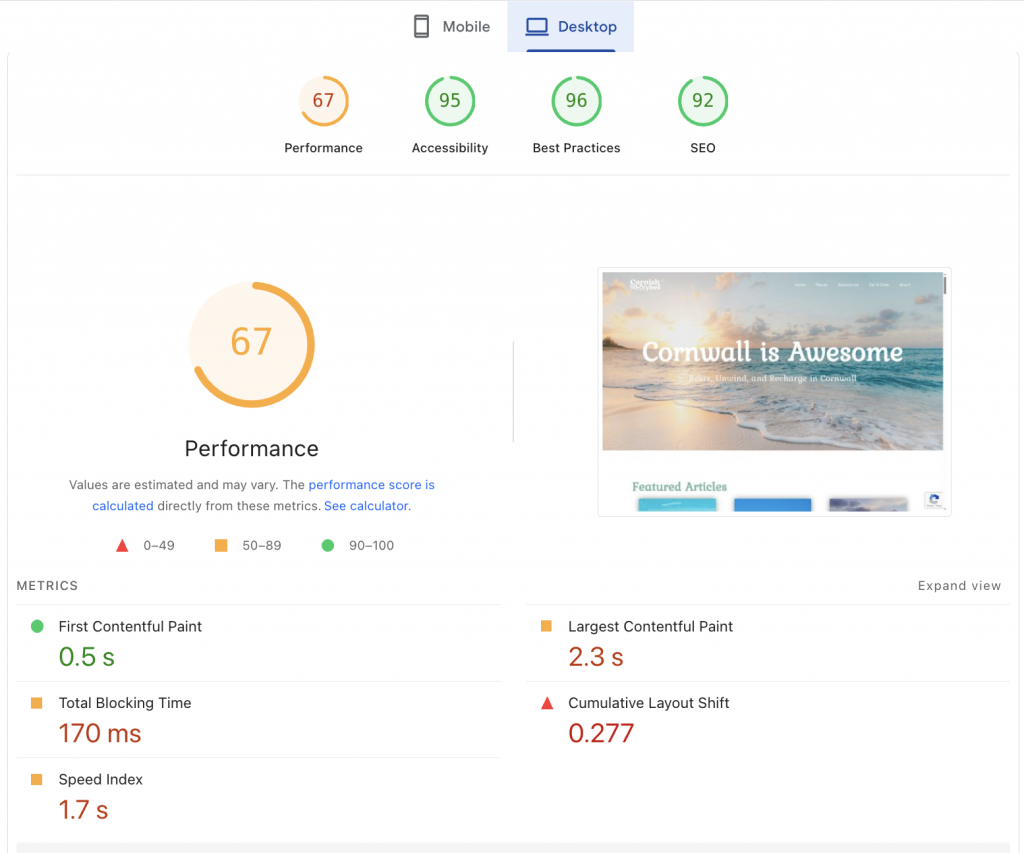
You can see it tests on mobile and desktop. You can see if your site passes for mobile. It shows the largest contentful paint, how quickly things start to load, any shifting issues on the website.
It gives you overall performance scores. You want to be up in the 90s. You want everything green.
It even gives you screenshots and all the diagnostics. It tells you what’s wrong with your website so you can start fixing it. Plus accessibility and SEO scores.
Competitor Research (Spy on Your Competition)
Let’s move on to competitor research. Let’s say we’re still talking about surfing in Australia.
The best place to start is on Google SERPs itself. You can scroll down and read the content, but you want data behind that as well.
7. Keywords Everywhere: The Chrome Extension Game-Changer
This is where Keywords Everywhere comes in. It’s a Chrome extension that gives you so much data within Google search.

You can see all this data right in your results:
- Domain authority of sites
- Referring domains
- Backlinks
- Spam scores
On the right-hand side, it tells you SEO difficulty out of 100. Whether it’s a branded query, on-page difficulty, how good your content needs to be, and how good your backlink structure needs to be.
This tells me straight away whether people are ranking because of good content or because of backlink quality and website authority.
In my mind: “Do I have an authority website? No? This could be tricky. Yes? Actually I just need good content and I’ll have a chance of ranking.”
What I love about this tool? It gives you related keywords and long-tail keywords. Now they’ve built in features that let you leverage ChatGPT.
You’ve got these built-in features:
- Get user search intent
- Analyze content type
- Cluster all keywords
- Analyze titles
- Check rankability for search
- Suggest anchor tags
You could say “analyze content type” and use ChatGPT. It puts a prompt in and runs it straight away.
You can start to see it building analysis. It might tell you three of the top pages are list posts. So you probably need to do a list post.
You can see there’s mixed search intent. But if you write a really good list post, you’ll have a good opportunity to rank in the top 10.
8. Detailed SEO: The Page Analyzer
An added bonus for competitor research is an extension called Detailed SEO.
This gives you lots of information when you’re looking at a page.
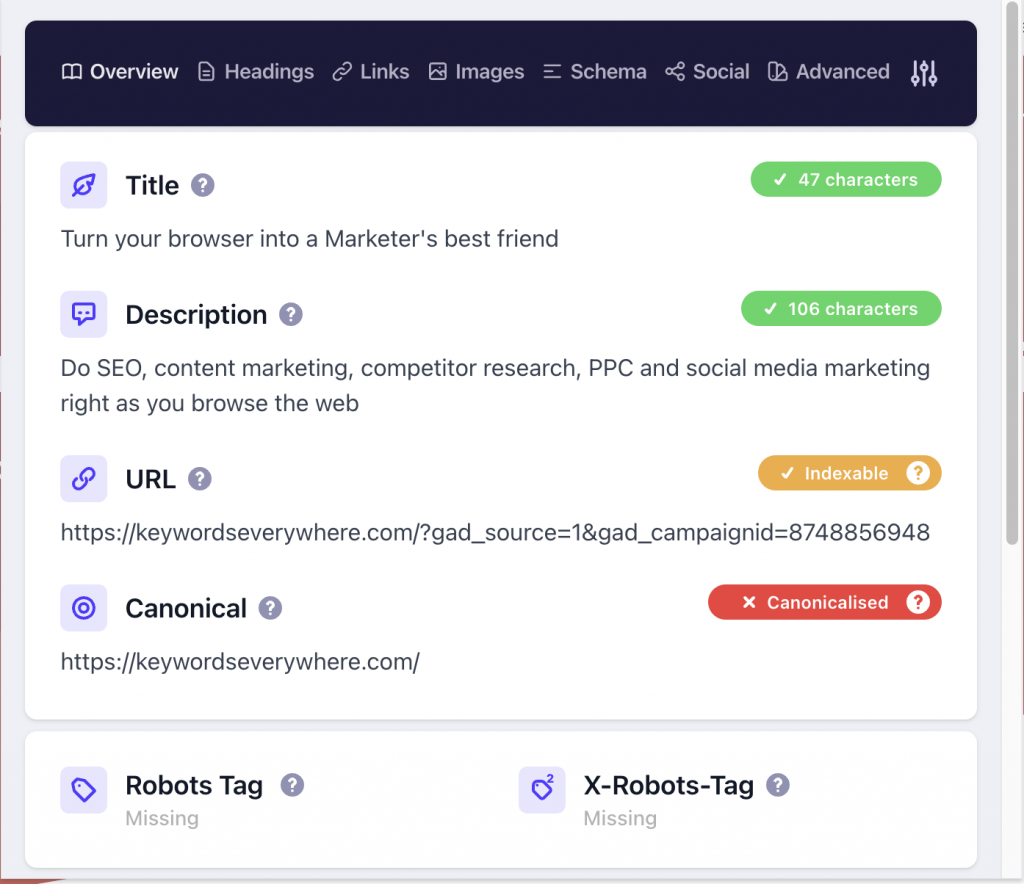
You can instantly see:
- Meta title and descriptions
- URL structure
- Any issues
- Word count
- Keyword priorities they’re chasing
- The structure of the page
This is pretty cool. If you’re trying to write a competing article, you know straight away what the structure of their page is.
You can start to see:
- Internal links they’ve got
- Images and schema markup
- Everything for your competitor research
You could do this for the top three or top 10 results to understand what you’re trying to rank for.
Content Briefing (Plan Your Attack)
When it comes to content briefing, it’s always been tricky. You can use ChatGPT, but it may not thoroughly analyze the SERPs to provide the information you need.
9. Robinize: Content Analysis
But there’s a tool I used to use called Robinize that offers free content briefing.
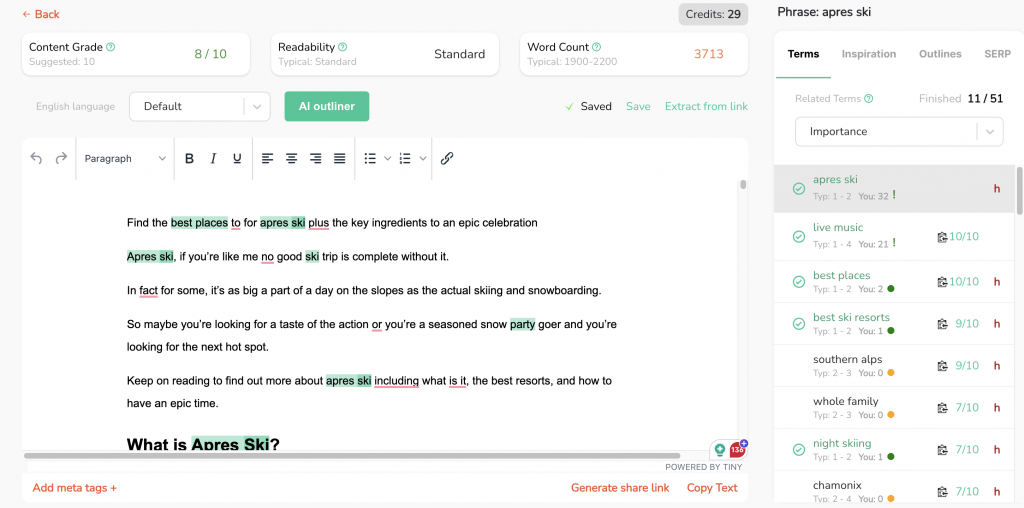
You get three free briefs a month. That’s not loads, but for a small business or individual, that could be plenty to get you up and running.
You can use it to create content briefs or optimize pages as well.
From an optimization point of view, this is great. You put your content in and it gives you a grade. It might say “four out of 10, fairly difficult read, which means it’s not greatly written.”
Your word count might be only 779, whereas typical competitors are around 3,000. So there’s a lot of work to do, and this is why you aren’t ranking.
It’s kind of a Surfer SEO competitor. You can see all the terms you should be putting in the content and how many. You can filter by unused, used, all that sort of thing. Add them into your content really easily by clicking.
You can also get inspiration from People Also Ask. This is great if you want to add an FAQ section or add more depth to your content.
You can look at your competitor’s outline and literally pull titles straight from competitor outlines. Even analyze the SERPs to see the score of all your other competitors.
There’s also a cool AI outliner that’s free to use. You can start adding this into your content brief and article outline. Even add metadata, generate titles, and descriptions.
This is all free. If you want to put one article out a week, this is going to be great for you.
On-Page Optimization (Polish Your Content)
Now you’ve done your keyword research, technical analysis, website audit, checked competitors, come up with content ideas, built content briefs, and written your content.
All that’s left is getting it published and making sure it’s optimized on your site.
There are two cool tools that are really easy. They’re free and great for beginners.
10. Yoast: The WordPress Essential
Let’s talk about Yoast. This is a long-time SEO tool. It’s actually the first SEO tool many people ever use because it’s a WordPress plugin.
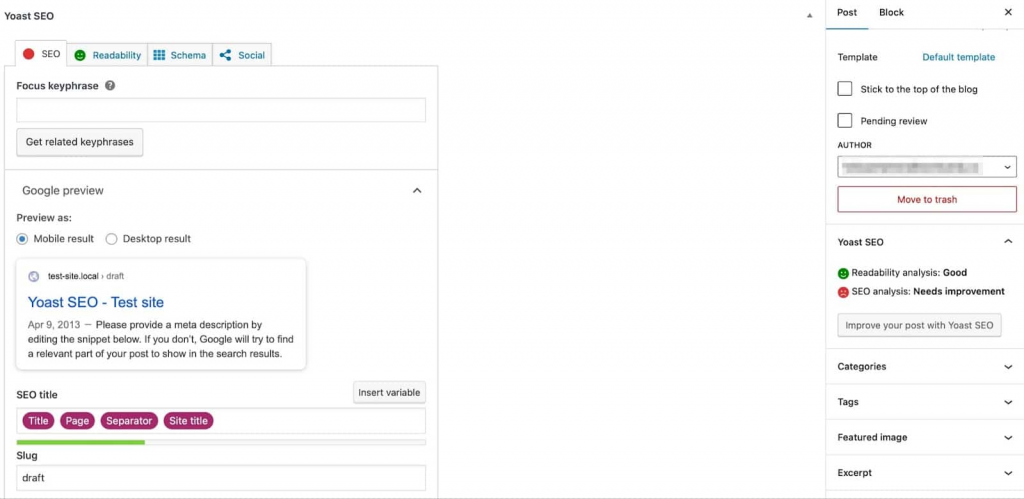
You install it on your WordPress and start getting a feel for how your SEO is scoring on your page.
Scroll down to the bottom of a post and you’ll see it. You can start adding your target keyword and it gives you a little score on how you perform with best practices.
You start to see hints like:
- “Your key phrase is not in the first paragraph”
- “You haven’t used it at all in your text”
- “It’s not in your attributes”
But it also tells you what you’re doing well:
- “You’re getting outbound links in there”
- “You’ve got images”
- “The keyword is in the title of your web page”
It’s a great little traffic light system. Getting all green lights doesn’t guarantee you’ll rank, but it’s a good indication you’re doing best practices.
11. Link Whisper: The Internal Linking Helper
Once you’ve started publishing plenty of content on your website, one secret trick for SEO is internal linking.
You want to create a nice spider’s web of content. Any searches fired out into the Google universe are going to catch in your web of content.
It helps you get more website users and builds your topical authority with Google.
Link Whisper is an SEO plugin that suggests internal links from one page of your website to another.

It’s not always 100% accurate, but it gives you good ideas. You can see opportunities where you should be doing internal links.
You might see you’ve mentioned “key stage one” in a blog post. Actually, you’ve got another page about key stage one and SATs in the UK. That should be an internal link.
The beauty of this tool? You can hit copy. It scrolls you to the text and you can add the internal link on your page.
Backlink Analysis (Know Your Authority)
I guess the only thing left is building backlinks.
12. Ahrefs: Free Backlink Checker
If you want to check the authority of your website and some backlinks pointing to your website or competitors, Ahrefs offers a free backlink checker that provides an overview.
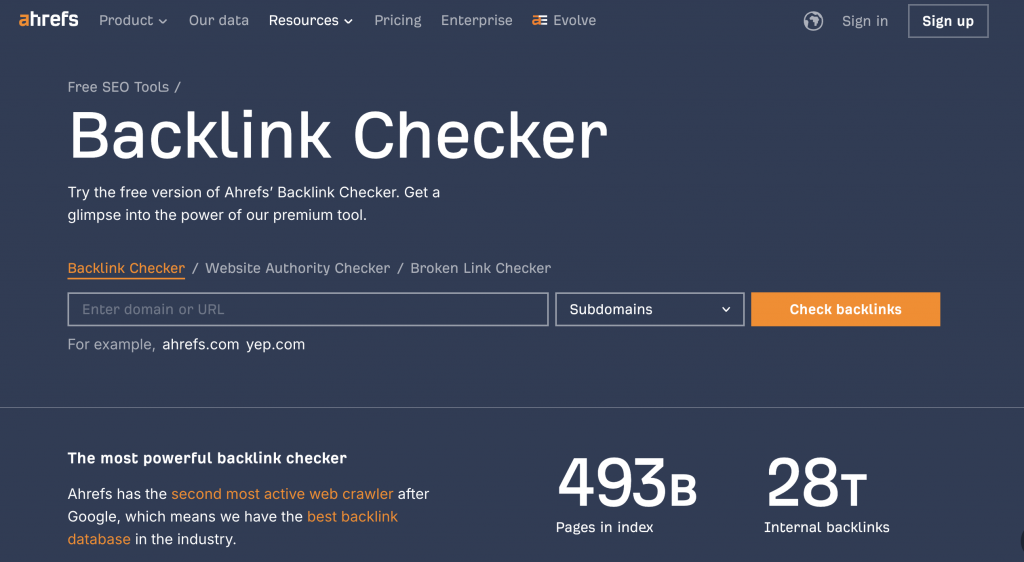
It’s their website authority checker. You can put it on your website or a competitor’s website and check the authority.
This helps you understand where you stand and compare yourself against competitors.
You might see a strong domain rating of 82 with millions of backlinks to a site. You can also check their backlinks with their broken backlink checker.
For most people, this gets quite advanced. But it’s helpful in understanding the landscape.
13. Google Search Console: Links Google Knows about
If you navigate to Links on the left side panel of your Google Search Console, you can see all the backlinks pointing to your website. You can gaurantee Google knows about these ones…
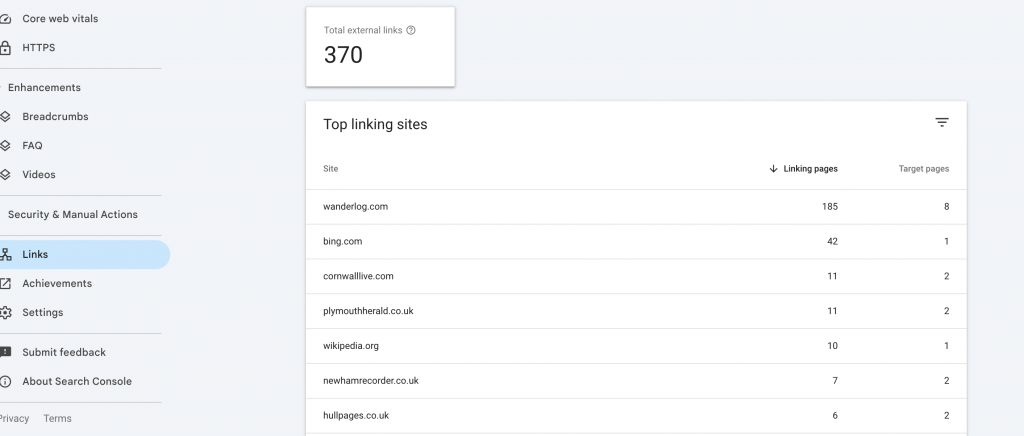
The Bottom Line: Your Complete Free SEO Arsenal
That rounds out a banging set of SEO tools. They’re going to get you from zero to a full SEO strategy.
If you go and execute this, you’re going to be able to generate tens of thousands of searches to your website.
Here’s your complete free SEO tools stack:
- Shuttle SEO (unlimited keyword ideas)
- Also Ask (3 searches/day)
- Semrush (10 searches/day)Google Search Console
- Screaming Frog (free tier)
- Page Speed Insights
- Keywords Everywhere (Chrome extension)
- Detailed SEO (Chrome extension)
- Robinize (3 briefs/month)
- ChatGPT integration
- Yoast (WordPress plugin)
- Link Whisper (internal linking)
- Ahrefs free tools
The best part? You can start using all of these today. No credit card required.
Stop making excuses about expensive tools. Everything you need to dominate SEO is available for free.
What’s the first tool you’re going to try? Drop a comment and let me know how your free SEO stack is working for you.


